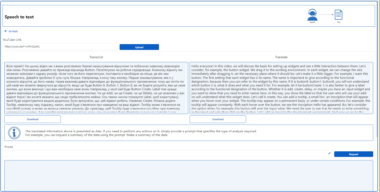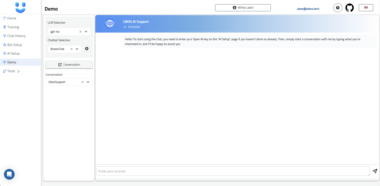Overview of Lingo.dev: AI-Powered Localization for Web & Mobile Applications
In the fast-paced digital world, reaching a global audience is no longer a luxury but a necessity. Lingo.dev, an open-source AI-powered Command Line Interface (CLI), revolutionizes the way web and mobile applications are localized. This innovative tool is tailored to provide seamless and rapid localization, making it an indispensable asset for developers and businesses aiming to expand their global footprint.
Unveiling the Power of Lingo.dev
Lingo.dev stands out as a community-driven, open-source CLI designed to automate and accelerate the localization process for web and mobile applications. It leverages cutting-edge AI technology to deliver authentic translations instantly, drastically reducing manual effort and management overhead. This allows teams to perform localization tasks 100 times faster, enabling them to ship features to a wider audience with ease.
Key Features of Lingo.dev
AI-Powered Translations: Utilizing the latest state-of-the-art language models, Lingo.dev ensures high-quality, natural translations that resonate with native speakers.
Flexible Integration: Whether using your own Language Model (LLM) or the Lingo.dev-managed Localization Engine, integration is seamless and quick, allowing for immediate deployment.
Comprehensive Language Support: Lingo.dev supports a wide range of languages, enabling businesses to reach diverse markets effortlessly.
Automation and CI/CD Integration: With GitHub Action support, Lingo.dev can automate localization in your continuous integration and delivery pipelines, ensuring translations are always up-to-date.
Caching with
i18n.lock: This feature tracks content changes, optimizing translation updates by skipping already translated content, thus saving time and costs.Format Agnosticism: Supports various file formats including JSON, YAML, CSV, Markdown, Android, and iOS, making it versatile and adaptable to different project needs.
Community-Driven Development: As a community-driven project, Lingo.dev encourages contributions and collaborations, fostering innovation and continuous improvement.
Use Cases of Lingo.dev
Global Product Launches: Companies aiming to launch products globally can utilize Lingo.dev for quick and accurate localization, ensuring their messaging is culturally relevant and effective in different regions.
E-commerce Expansion: Online retailers can expand their reach by localizing their platforms to cater to international customers, enhancing user experience and increasing sales.
Multinational Enterprises: Large organizations with diverse teams can maintain consistent communication across regions by utilizing Lingo.dev for internal documentation and communications.
Startups and SMEs: Smaller businesses can leverage Lingo.dev to compete on a global scale without the need for extensive resources or localization expertise.
Integration with UBOS Platform
Lingo.dev is an integral part of the UBOS platform, a full-stack AI agent development platform focused on bringing AI agents to every business department. UBOS facilitates the orchestration of AI agents, connecting them with enterprise data, and building custom AI solutions. By integrating Lingo.dev with UBOS, businesses can enhance their localization processes, ensuring that their AI agents are equipped with the most accurate and culturally relevant data.
Conclusion
In conclusion, Lingo.dev offers a powerful solution for businesses seeking to enhance their global presence through effective localization. Its AI-powered capabilities, combined with seamless integration and community-driven development, make it a standout tool in the localization landscape. Whether you’re a startup or a multinational corporation, Lingo.dev equips you with the tools needed to communicate effectively with a global audience.
Lingo.dev
Project Details
- lingodotdev/lingo.dev
- Apache License 2.0
- Last Updated: 4/14/2025
Categories
Recomended MCP Servers
A Model Context Protocol (MCP) server for Rember.

MCP server implementation that enables AI assistants to search and reference Kibela content
Official MiniMax Model Context Protocol (MCP) JavaScript implementation that provides seamless integration with MiniMax's powerful AI capabilities including...

MCP Think tool prebuilt binaries and code

MCP Server for Shopify API
Terraform Registry MCP Server

A Model Context Protocol (MCP) server for web content scanning and analysis. This server provides tools for fetching,...
A powerful browser automation and testing server using the Model Context Protocol (MCP). Enables AI agents to control...
The Excel MCP Server is a powerful tool that enables natural language interaction with Excel files through the...
MCP server enabling high-quality image generation via Together AI's Flux.1 Schnell model.

A Model Context Protocol (MCP) server that enables AI assistants to interact with HubSpot CRM data, providing built-in...
 From vibe coding to vibe deployment. UBOS MCP turns ideas into infra with one message.
From vibe coding to vibe deployment. UBOS MCP turns ideas into infra with one message.






